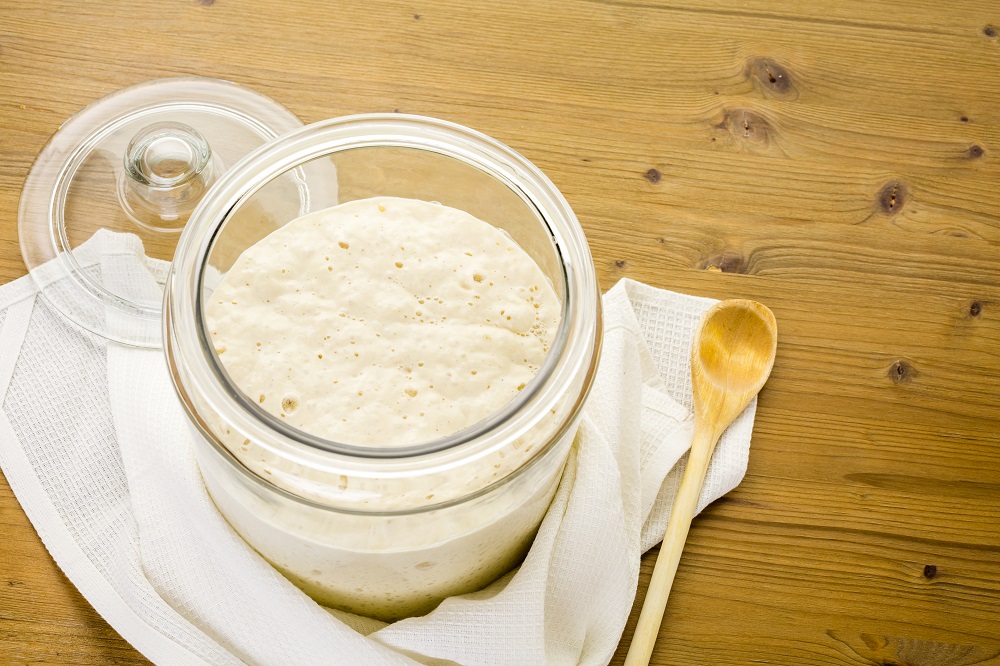Sourdough is an iconic type of bread that characteristically uses wild microorganisms for leavening instead of commercial yeasts. The use of random wild microorganisms is attributed to the complex and dynamic flavor profile of sourdough bread and pastries (1). With a sourdough starter, the ingredients and methods used to make sourdough are highly similar. However, it is still important to examine these products if whether they are appropriate for people with vegan lifestyles or not.
Sourdough should be technically vegan since its production does not include any animal product or derivative. However, such as the case for bread in general, there are certain factors to look out for when it comes to sourdough. Bakers can use additional ingredients during the production process that are non-vegan such as milk, eggs, and butter. To stay on the safe side, it is important to ask the bakers regarding such matters.
The main difference between sourdough and conventional bread is that leavening – specifically, the microorganisms involved (2). In conventional breadmaking, dehydrated yeast is used to make the bread rise. In the case of sourdough, the production process uses naturally occurring microorganisms such as yeasts and lactic acid bacteria. The wild microorganisms obtained from the flour, the air, the hands, the equipment, and everything else help create the dynamic flavor profile associated with sourdough.

Thus, sourdough production begins at the production of the starter – the starting culture of microorganisms that will be used later.
Creating a sourdough starter begins by mixing flour and water in a container. The process also includes “feeding” the starter by periodically taking away some of the starter and replenishing the container with new flour and water. The period allowed for starter culturing depends on the baker, but this is the simplified explanation of how sourdough starters are made.
Once a starter is available, the sourdough production process can begin.
In a sufficiently sized bowl, water, flour, and the starter are mixed thoroughly. When the mixture is thoroughly mixed, a towel is placed on top, and the bowl is left to sit somewhere warm for an hour to rest. After an hour, some salt and additional water are added and thoroughly mixed in as well. At this point, the dough is then stretched and folded over itself to add tension.
Afterward, the mixture is covered with a towel again and left to rest for another hour. The dough can then be stretched and folded over itself again several more times before letting it rest for another hour. It is up to the baker’s discretion how many more times they want to repeat this part of the process.
Once the baker is satisfied with the dough, the dough can then be pre-shaped. The dough is removed from the bowl and transferred onto a clean tabletop. After a light sprinkling of flour, the dough is then manipulated into a tight ball. Then the dough ball is covered and allowed to rest again after another slight sprinkling of flour.
After allowing it to rest, the dough ball is then transferred to a proofing basket or any sufficiently sized bowl lined with a cotton towel. The proofing basket is then covered with a towel and placed inside the refrigerator overnight.
After being cooled overnight, the dough can then be scored and baked.
The difference between sourdough and typical white bread is simply the microorganisms used. Since bread uses typical store-bought yeast, you can expect a similar taste when you purchase the same brand of bread. However, sourdough bread is considered to have a more robust and dynamic flavor, and this could be attributed to the different microorganisms that play a role in its production.
Since sourdough bread is technically made from basic breadmaking ingredients such as flour, water, and salt, it should be perfectly vegan for most people.
However, there are ways sourdough can become non-vegan. Thus, it is important for vegans to look out for common situations that could potentially turn sourdough bread into a non-vegan food item.
Firstly, sourdough is typically produced using unbleached and relatively unprocessed types of flour to get more microorganisms in the starter. However, some bakers can possibly use enriched flour. This type of flour can be enriched with vitamins and minerals that make products healthier. However, some enriched flours contain vitamin D. While vitamin D is an incredibly important vitamin, the majority of commercially produced vitamin D is not vegan since the vitamin is produced using sheep’s wool (3).
Secondly, bakers can add additional ingredients to influence flavor. Like other types of bread, bakers can add milk, eggs, and butter when baking this bread. Thus, it is important to ask the baker if they added non-vegan ingredients to their sourdough.
Next, it is common for bakers to grease their tins when baking bread. Commonly used grease for baking includes vegetable oils, margarine, and butter. Thus, it is possible for the sourdough bread to be non-vegan if the baking process involved greasing pans with butter.
Some bakers would also add ingredients to sweeten the sourdough as a way to lessen the sour taste. Thus, commonly used sweeteners include sugar and honey. For one, honey is certainly non-vegan since it is a product that is directly obtained from animals. Aside from being an animal product, many vegans avoid honey for environmental reasons since beekeeping causes declines in native bee populations due to aggressive competition (4).
Many vegans also choose to avoid sugar. Although sugar should be vegan since it is produced from plant sources, there are some sugar companies that would process the sugar using animal products such as bone char – a cheap and effective filter (5). Considered as a gray area ingredient, many vegans would rather avoid sugar as a precaution.
Due to these factors, it is highly important to have an open line of communication with the baker to determine if the sourdough they produce is indeed vegan or not.
References
